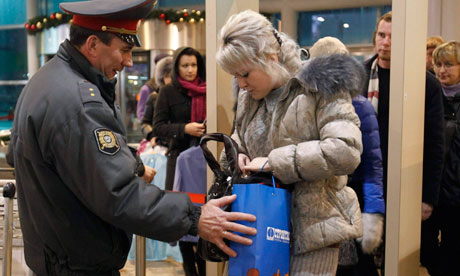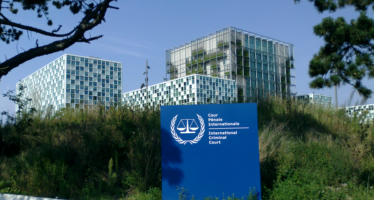Moscow airport bomb: Medvedev blames security lapses
![]()
Russian president says airport officials must bear responsibility for attack that killed at least 35 people, including Briton Gordon Campbell Cousland
Tom Parfitt in Moscow and Luke Harding

Russian President Dmitry Medvedev said today that officials at Moscow’s busiest airport must bear responsibility for security lapses which allowed a suspected suicide bomber to blow himself up, killing at least 35 people, including at least one Briton.
The bomber entered the ground floor of Domodedovo airport’s terminal building apparently unchallenged yesterday. He then made his way to the crowded international arrivals zone. At 4.32pm local time he set off a massive explosive device, possibly hidden in a suitcase, causing a blast equivalent to 7kg of TNT. There have been claims that law enforcement officials were tipped off about a possible airport bombing – Russian opposition bloggers demanded to know why security measures had not been enhanced in response.
“What happened shows that obviously there were violations in guaranteeing security. And it should be answered for by those who make decisions there and by the management of the airport,” Medvedev said.
He has postponed his departure to Switzerland for today’s World Economic Forum in Davos.
The dead Briton was named today as Gordon Campbell Cousland. Russia’s emergencies ministry had said that two Britons were among the eight foreign citizens who died in the attack, but the UK foreign office said it could confirm only one death.
A Foreign Office spokesman said: “Initial indications are that one British national was killed in the explosion at Domodedovo airport. We are in contact with next of kin and providing consular assistance.
“The consular team is continuing to investigate reports that a second British national was killed but we have no information to confirm this at this time.”
Two flights from London Heathrow arrived at the airport shortly before the explosion.
British national Jeremy Spencer, who was on the BA flight which landed around 45 minutes before the fatal blast, was less than 100 metres away from the bomb blast.
Amateur video by Stanislav Grigorievich captures the aftermath of the bomb in Moscow’s Domodedovo airport Link to this video
Describing the moment the device detonated, he told BBC Radio 5 Live: “There was a very loud boom that shook the floor and ceiling and then there was dust falling down from the ceiling. We were told it was a car bomb by some fellow travellers, but initially I thought it was a construction accident as there was some work being done inside the terminal.”
Spencer, who was travelling alone, was making his way through passport control when the blast happened. “After the explosion people were reaching for their mobile phones to find out what had happened,” he said. “It was quite calm where I was and there was no evacuation notice or anything like that.”
Up to 168 people were injured, many of them critically. Relatives waiting to meet family members and arriving passengers were killed instantly.
Witness Artyom Zhilenkov, 30, who survived the blast, told the Guardian: “There was a massive boom and then a wave of heat and pressure that swept along the floor, bent my legs and flung me aside.
“I was looking toward a dark-skinned man when it happened. I think it was the suitcase standing next to him that exploded.”
According to unconfirmed reports, investigators found the head of a man aged 30 to 35, who is thought to be the suicide bomber.
Video footage from the airport showed bodies seemingly piled in a heap, fires burning, and abandoned luggage. Rescuers were shouting through the smoke. Some of the wounded were transported to ambulances on baggage trolleys.
The blast was the worst terrorist attack in Russia since two female suicide bombers from the volatile Dagestan region blew themselves up on Moscow’s metro last March, killing 40 people. The Kremlin insists the situation in Russia’s north Caucasus has stabilised after two brutal federal wars against Chechen rebels in 1994-1996 and 1999-2005. But the attack appears to show a renewed capacity by Islamist radicals to hit soft civilian targets in the capital.
The attack also comes at a time of political uncertainty for Russia. The question of who will lead the country after presidential elections next year is so far unresolved. It is unclear whether Vladimir Putin, Russia’s prime minister and pre-eminent political figure, will return to the Kremlin, or allow President Dmitry Medvedev, in effect Putin’s deputy, another term.
Domodedovo is the most modern and efficient of Moscow’s three airports, and is a hub for British Airways and BMI. Both operate daily flights between London and Moscow, popular with Russians travelling to London and British expats based in the Russian capital. BA’s flight 872, with 165 passengers, landed at 3.46pm, followed by BMI flight BD891, carrying 103 passengers and crew. It touched down at 4.33pm, seconds after the blast. The next BA flight, 874, was halfway to Moscow when it turned round and returned to Heathrow.
Russian investigators were analysing CCTV footage from the scene, amid claims they had been warned a week ago about a possible airport bombing.
According to a law enforcement official, quoted by Russian news agencies, police were tracking three men and had been told an attack “could take place”. One of the three could have been the suicide bomber, it was suggested. Another source told the news agency Interfax: “According to intelligence, three men may have been involved in organising the explosion, men who have been living in the region of the capital for some time. They have been put on the wanted list.”
He said the three suspects were believed to be militants from the north Caucasus. They allegedly had connections to a woman who blew herself up in Moscow on 31 December and another who was later arrested in Volgograd. “It can’t be ruled out that one of the three blew himself up at Domodedovo,” the source said.
The attack is likely to be blamed on Islamist radicals. Across its mountainous southern frontier the Russian state is fighting a group of determined and well-organised insurgents who want to establish a pan-Islamic caliphate. The republics of Ingushetia, Chechnya, and Dagestan – where the insurgents operate – are gripped by conflict, with daily attacks on police and local security forces.
The Kremlin has responded to this threat to its integrity with characteristic brutality. It has launched a series of special operations. Last year, its special forces killed Said Buryatsky, a senior rebel and Russian-born Islamist convert, in a village in Ingushetia.
Another insurgent leader, Egyptian-born Saif Islam, was killed in Dagestan. These killings may have prompted the two women to set off to Moscow last spring on a revenge suicide mission.
In 2008, Doku Umarov, Chechnya’s most senior surviving rebel leader, promised to take his violent campaign to Russia’s towns and cities. He indicated he had reconstituted the suicide brigades used to devastating effect during the second Chechen war – which involved the bombing of the Moscow metro in 2004, as well as the hijacking of a Moscow theatre and the siege of Beslan, a school in south Ossetia in which 300 people, mainly children, died. It appears that the rebels have once again demonstrated a capacity to hit deep into the heart of the Russian state.
Related Articles
EMIGRACION, LA HERIDA SANGRANTE
![]()
La emigración en Cuba no es diferente a fenómenos similares que se desarrollan en su entorno natural: Latinoamérica y Caribe
¿Cuál será el mejor nombre para la operación de EU en Siria?
![]()
Estadunidenses de origen sirio expresaron ayer frente a la Casa Blanca su rechazo a una ofensiva militar contra Damasco Foto
Guyana/Venezuela: Corte Internacional de Justicia se declara competente
![]()
El pasado 18 de diciembre del 2020, la Corte Internacional de Justicia (CIJ) dio a conocer su fallo en el que se declara competente para conocer de la demanda interpuesta por Guyana contra Venezuela en el 2018




